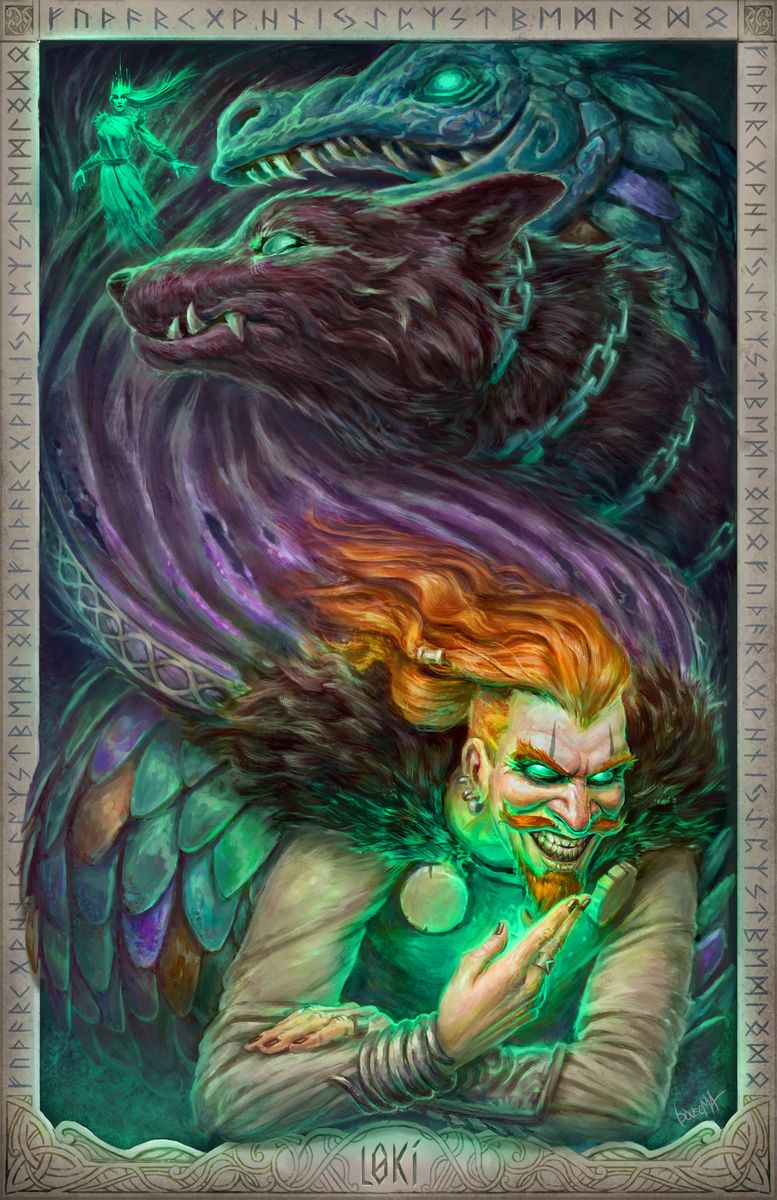Loki is a prominent figure in Norse mythology, known for his cunning, mischievous nature, and his shape-shifting abilities. He is one of the few figures in Norse mythology who appears as both a god and a giant, and he plays a central role in many of the stories and myths.
Loki's parentage is a matter of some debate in Norse mythology. According to the Prose Edda, he is the son of the giantess Laufey and the god Fárbauti, while the Poetic Edda identifies him as the son of the giantess Angrboða and an unknown father. Regardless of his parentage, Loki is considered to be a god in Norse mythology and is often counted among the Aesir, the main group of gods.
Loki is perhaps best known for his role in the death of Baldr, one of the most beloved gods in Norse mythology. According to the story, Baldr had a dream in which he was killed by an unknown assailant. The other gods then made every object in the world swear not to harm Baldr, but Loki, in the form of a woman, tricked Baldr's blind brother, Hodr, into throwing a spear made of mistletoe, which killed Baldr. As a result of this deed, Loki was punished severely, including being bound with the entrails of one of his own sons and left to suffer until Ragnarok.

Loki is also responsible for a number of other misdeeds in Norse mythology. He is said to have stolen Thor's hammer, which was essential for Thor's role as the protector of the gods, and he is also known for causing trouble at the banquet of the gods by insulting them and creating chaos. Loki's penchant for causing mischief and chaos is a recurring theme in Norse mythology, and he is often portrayed as being at odds with the other gods and causing trouble wherever he goes.
Despite his mischievous nature, Loki is also a complex figure in Norse mythology. He is known for his wit and intelligence, as well as his charm and good looks. In addition to his role as a trickster, he is also responsible for several important creations in Norse mythology, including the golden boar that pulls Freyja's chariot and Odin's spear, Gungnir. He is also said to have had many children, including the monstrous wolf Fenrir, the serpent Jörmungandr, and the goddess Hel.
Loki's role in Ragnarok, the end of the world in Norse mythology, is also significant. He is said to lead the army of the giants against the gods, and his battle with Heimdallr, the guardian of Asgard, ultimately leads to both of their deaths.
In terms of his appearance, Loki is described as being handsome and charming, with bright red hair and a thin mustache. He is often depicted wearing a cloak or carrying a staff, and he is known for his ability to change his shape at will.
Overall, Loki is a fascinating and complex figure in Norse mythology, known for his cunning, mischief, and intelligence. While he is often at odds with the other gods and causes trouble wherever he goes, he is also responsible for many important creations and is a central figure in many of the most important stories and myths.
Loki in Norse mythology:
-
Loki is a major figure in Norse mythology, first mentioned in the Prose Edda. He is a trickster god and a shape-shifter, known for his cunning and mischievous nature. (Prose Edda, Gylfaginning 20)
-
Loki's parentage is a matter of some debate in Norse mythology, but he is often referred to as the son of the giantess Laufey and the god Fárbauti. (Prose Edda, Gylfaginning 33)
-
Loki is responsible for the death of Baldr, which is recounted in both the Prose Edda and the Poetic Edda. In the Prose Edda, the story is told in the Gylfaginning section, while in the Poetic Edda it is related in the poem "Baldr's Dreams." (Prose Edda, Gylfaginning 49-51; Poetic Edda, Völuspá 32-33, 49)
-
Loki is also responsible for a number of other misdeeds in Norse mythology, including the theft of Thor's hammer, which is recounted in the Poetic Edda poem "Thrymskvitha." (Poetic Edda, Thrymskvitha)
-
Loki's role in Ragnarok, the end of the world in Norse mythology, is also significant. He leads the army of the giants against the gods and is ultimately killed by Heimdallr. (Prose Edda, Gylfaginning 51-52)
-
In addition to his mischief-making, Loki is also known for his sexual exploits in Norse mythology. He is said to have had many offspring, including the monstrous wolf Fenrir, the serpent Jörmungandr, and the goddess Hel. (Prose Edda, Gylfaginning 34)
-
Loki's appearance is also described in Norse mythology. He is said to be handsome and charming, with bright red hair and a thin mustache. (Prose Edda, Gylfaginning 33)
These are just a few of the references to Loki in Norse mythology, but they provide a good sense of his complex and multifaceted character.